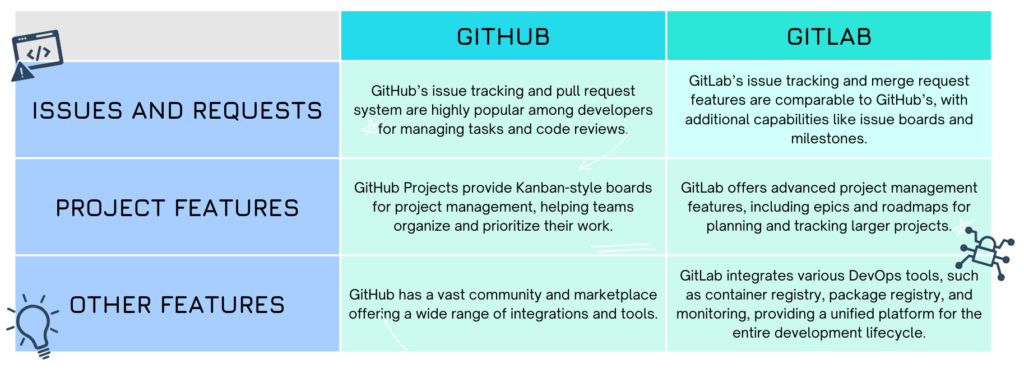In the world of software development, version control systems (VCS) are the unsung heroes, quietly managing changes to source code over time and enabling collaboration among developers. Among the most popular VCS platforms are GitHub and GitLab. Both platforms offer robust features for version control, collaboration, and continuous integration/continuous deployment (CI/CD). So, how do you decide which one to use? Let’s dive into a detailed comparison of GitHub vs. GitLab, looking at definitions, features, statistics, and use cases to help you make an informed decision.

Launched in 2008, GitHub is a web-based platform that uses Git for version control. It's a household name in the developer community, widely known for hosting open-source projects and facilitating collaboration among developers. GitHub offers a suite of tools for code review, project management, and CI/CD, making it a comprehensive platform for software development.

GitLab, founded in 2011, is another Git-based platform offering similar functionalities to GitHub. However, GitLab stands out by providing an integrated DevOps lifecycle, including built-in CI/CD, security features, and deployment tools. GitLab is available as both a cloud-hosted service (GitLab.com) and a self-hosted version (GitLab CE/EE).
GitHub offers unlimited public repositories and limited private repositories under its free plans. However, with paid plans, you get unlimited private repositories. This flexibility makes GitHub ideal for both open-source projects and private development. Moreover, GitHub supports comprehensive branching and merging strategies. This allows multiple developers to work on different features simultaneously without conflicts, facilitating collaborative workflows.
Additionally, GitHub Actions provides powerful CI/CD capabilities. This enables developers to automate workflows directly within the repository. Consequently, this integration helps streamline development processes and ensures continuous integration and deployment.
Similarly, GitLab provides unlimited public and private repositories in both free and paid plans. This offers flexibility for a wide range of projects and development needs. Like GitHub, GitLab supports advanced branching and merging strategies. This allows for efficient collaborative workflows.
GitLab’s merge request system is comparable to GitHub’s pull requests. It helps manage code reviews and integrations effectively. Furthermore, GitLab offers built-in CI/CD pipelines. This enables seamless integration and deployment processes. This feature simplifies the CI/CD setup and provides a cohesive environment for managing the entire development lifecycle within GitLab.

GitHub:
GitLab:
To better understand the popularity and usage of GitHub and GitLab, let’s look at some statistics and market share data:
GitHub:
GitLab:
While market share shows a disproportion, each platform excels in different areas and is better suited for specific types of projects. Use GitHub if you are working on open-source projects that benefit from a large community, need extensive integrations and a wide range of third-party tools, or prioritize simplicity and a well-established ecosystem.
On the other hand, choose GitLab if you require an integrated DevOps platform with built-in CI/CD, need advanced security and compliance features, or prefer a self-hosted option for greater control over your infrastructure. Each platform’s unique strengths make it ideal for different project requirements, so your choice should align with your specific needs and goals.
GitHub is the go-to platform for open-source projects due to its vast community and extensive features for collaboration. Many high-profile projects, such as Linux, TensorFlow, and React, are hosted on GitHub. Gitlab it is more commonly chosen for projects that require integrated CI/CD and DevOps features. GitLab’s self-hosted option makes it an attractive choice for organizations that need control over their infrastructure.
GitLab’s comprehensive DevOps capabilities make it a strong contender for enterprise use. GitLab Ultimate offers features like portfolio management, compliance controls, and advanced security, making it suitable for large-scale enterprise environments. Companies like Siemens, T-Mobile, and Goldman Sachs use GitLab for their DevOps processes. GitHub Enterprise provides enhanced security, compliance, and management features tailored for large organizations. Companies like Microsoft, IBM, and Shopify use GitHub Enterprise for their development needs.
GitLab Continues Integration & Continues Deployment is built into the platform, offering a seamless and integrated experience. Developers can define pipelines using '.gitlab-ci.yml' files, and GitLab provides runners to execute jobs. GitLab’s Auto DevOps feature automates the CI/CD process, simplifying deployment pipelines. GitHub Actions allows developers to create custom CI/CD pipelines using YAML configuration files. GitHub’s integration with various third-party CI/CD tools provides flexibility for different workflows.
Includes unlimited public/private repositories, basic CI/CD with GitHub Actions, and community support.
$4 per user/month, offering advanced collaboration tools, code owners, and additional security features.
Custom pricing, providing enhanced security, compliance, and administrative controls.
Includes unlimited public/private repositories, basic CI/CD, and essential collaboration features.
$19 per user/month, offering advanced CI/CD, performance monitoring, and project management features.
$99 per user/month, providing comprehensive DevOps tools, security features, and compliance management.
Both GitHub and GitLab are powerful platforms for version control, collaboration, and CI/CD. The choice between the two often depends on the specific needs of the development team or organization.
Choose GitHub if: You need a platform with a large community, extensive integrations, and strong support for open-source projects. GitHub’s simplicity and popularity make it a go-to choice for many developers.
Choose GitLab if: You require an integrated DevOps platform with built-in CI/CD, security features, and advanced project management tools. GitLab’s self-hosted option and comprehensive feature set make it ideal for organizations seeking a unified development environment.
In summary, both GitHub and GitLab offer unique strengths, and the best choice will depend on your specific use case, team preferences, and organizational requirements. Whether you prioritize community and simplicity or integrated DevOps capabilities, both platforms provide robust solutions for modern software development.